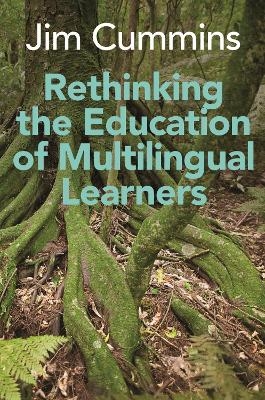
Rethinking the Education of Multilingual Learners
Multilingual Matters (Verlag)
978-1-80041-357-3 (ISBN)
Over the past 40 years, Jim Cummins has proposed a number of highly influential theoretical concepts, including the threshold and interdependence hypotheses and the distinction between conversational fluency and academic language proficiency. In this book, he provides a personal account of how these ideas developed and he examines the credibility of critiques they have generated, using the criteria of empirical adequacy, logical coherence, and consequential validity. These criteria of theoretical legitimacy are also applied to the evaluation of two different versions of translanguaging theory – Unitary Translanguaging Theory and Crosslinguistic Translanguaging Theory – in a way that significantly clarifies this controversial concept.
Jim Cummins is Professor Emeritus at the University of Toronto, Canada and has spent the past 40 years researching and working with multilingual learners across the world. His controversial theoretical distinction between conversational versus academic language proficiency is a key topic in pre-service and professional development related to the education of multilingual students who are learning the language of instruction.
Acknowledgements
Lily Wong Fillmore: Foreword
Series Editor’s Preface
Tove Skutnabb-Kangas: Preface
Part 1: Evolution of a Theoretical Framework: A Personal Account
Chapter 1. Core Ideas and Background Influences
Chapter 2. Resolving Contradictions: Cognitive Consequences of Bilingualism
Chapter 3. Linguistic Interdependence: Accounting for Patterns of Bilingual Academic Development
Chapter 4. Language Proficiency and Academic Achievement
Chapter 5. Power Relations in School: Constructing or Constricting Identities?
Chapter 6. Reversing Underachievement: An Integrated Framework
Part 2: Critical Analysis of Competing Theoretical Claims
Chapter 7. How Do We Assess the Legitimacy of Theoretical Constructs and Claims?
Chapter 8. Is ‘Academic Language’ a Legitimate Theoretical Construct?
Chapter 9. Are ‘Linguistic Interdependence’ and the ‘Common Underlying Proficiency’ Legitimate Theoretical Constructs?
Chapter 10. Unitary Translanguaging Theory and Crosslinguistic Translanguaging Theory: A Comparative Analysis
Part 3: Instructional Practice in Dialogue with Theoretical Concepts
Chapter 11. Teachers as Knowledge Generators: Learning from Inspirational Pedagogy
About the Author
References
Index
| Erscheinungsdatum | 02.09.2021 |
|---|---|
| Reihe/Serie | Linguistic Diversity and Language Rights |
| Sprache | englisch |
| Maße | 156 x 234 mm |
| Gewicht | 710 g |
| Themenwelt | Geisteswissenschaften ► Sprach- / Literaturwissenschaft ► Sprachwissenschaft |
| Sozialwissenschaften ► Pädagogik ► Sonder-, Heil- und Förderpädagogik | |
| ISBN-10 | 1-80041-357-2 / 1800413572 |
| ISBN-13 | 978-1-80041-357-3 / 9781800413573 |
| Zustand | Neuware |
| Informationen gemäß Produktsicherheitsverordnung (GPSR) | |
| Haben Sie eine Frage zum Produkt? |
aus dem Bereich


